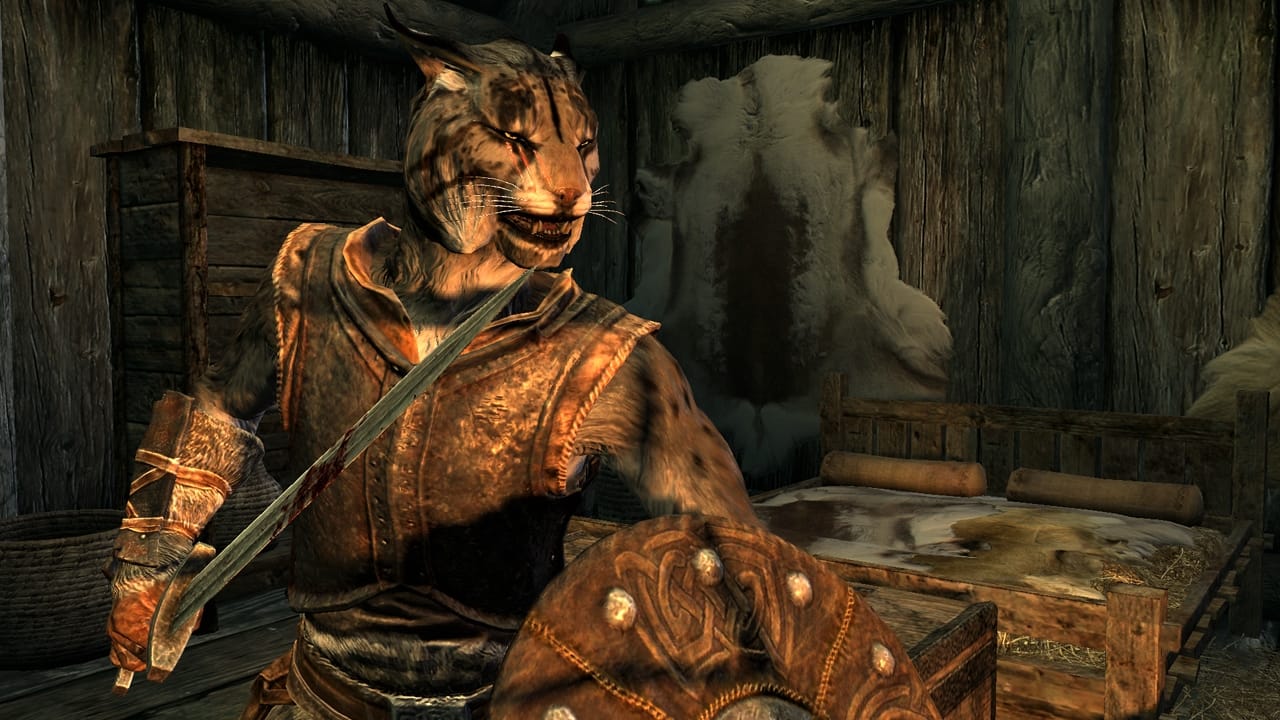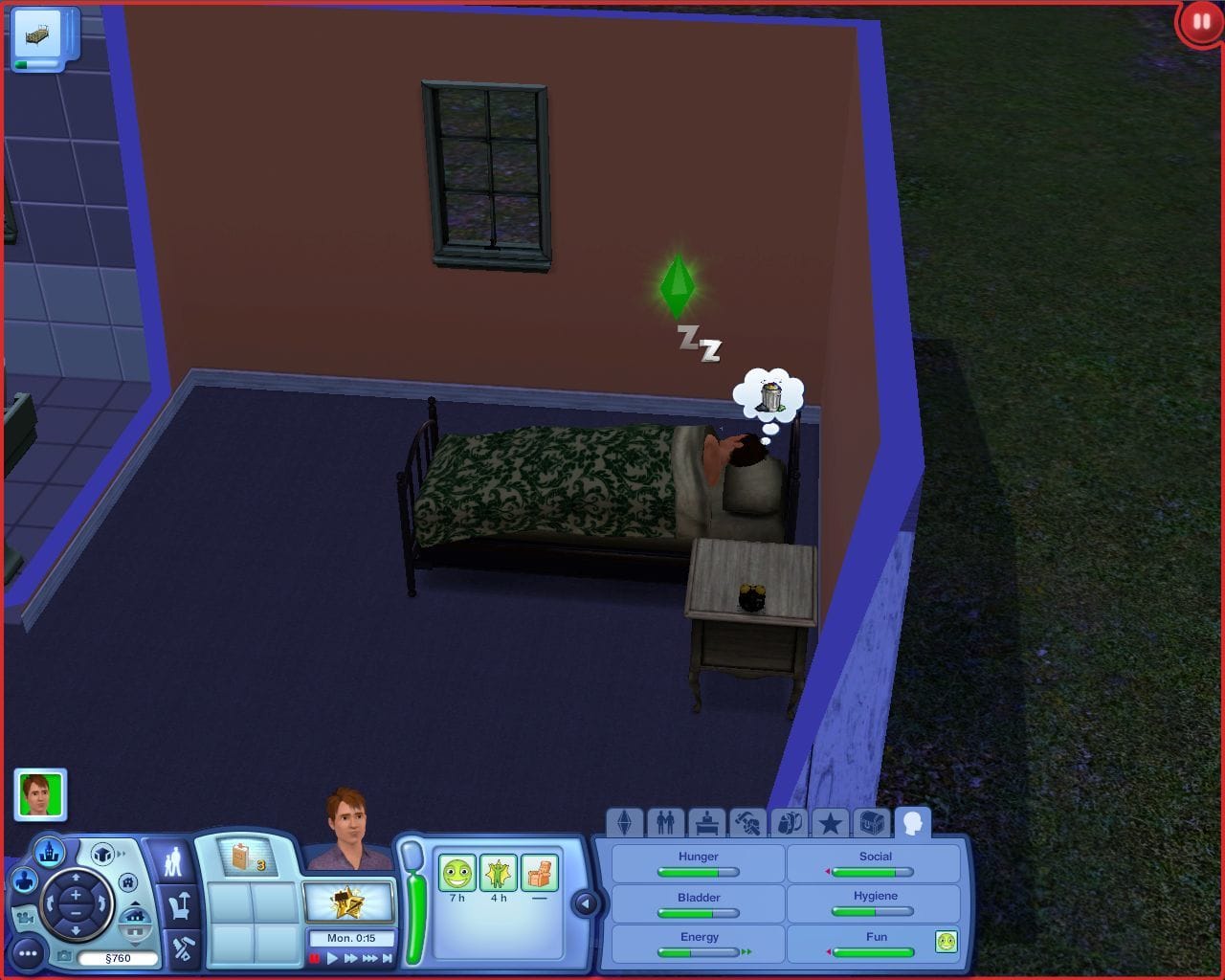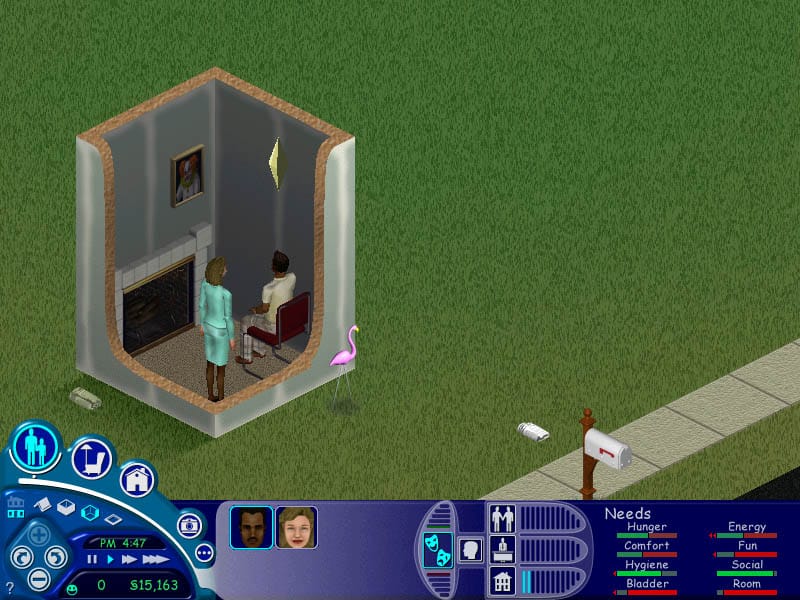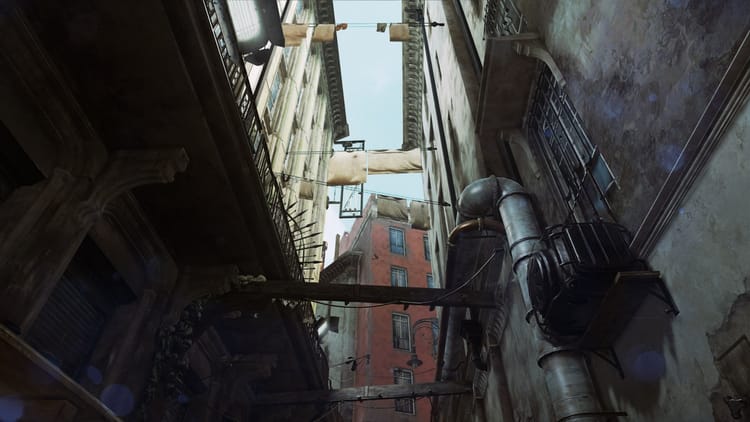Videogames and the end of sleep

In 2005, following the public outrage over the abuse of prisoners at Abu Ghraib prison in Iraq, the research group Gallup organized a survey to gauge Americans’ attitudes towards the “enhanced interrogation techniques” employed by intelligence services in the War on Terror. When presented with descriptions of such methods, including waterboarding, mock executions, religious violation, and the threat of attack dogs, the overwhelming majority of those polled rejected them as morally impermissible torture. But a single practice, sleep deprivation, was deemed acceptable by half of all respondents on the basis that it doesn’t constitute torture, per se, but “psychological persuasion.”
Bullshit. Though accounts of sleep deprivation for purposes of coercion can be found as far back as Antiquity, its systematic use coincides with the invention of high-intensity electric lights and sustained sound amplification in the mid-20th century. Interrogators at Guantanamo Bay are known to have subjected prisoners to Metallica’s “Enter Sandman” at ear-splitting volumes (James Hetfield, the band’s lead vocalist and rhythm guitarist, initially boasted that he was proud of this particular application of their music). Sleep deprivation, in other words, is a distinctly modern practice. Above all, it is designed to obliterate a prisoner’s sense of self and generate a state of utter helplessness and absolute pliability—the ideal subject(tivity) for interrogation. Writing in his recent book 24/7: Late Capitalism and the Ends of Sleep (2013), Jonathan Crary censures the practice as not simply a biological affront, but a psychological one as well: “The denial of sleep,” he concludes, “is the violent dispossession of the self by external force, the calculated shattering of an individual.”
Sleep deprivation is a distinctly modern practice
Crary’s book is deliberately provocative—“a polemic as finely concentrated as a line of pure cocaine,” zings one back-cover review—and so should probably read more as a manifesto than a work of serious scholarship. But his central claim, that the modern world and its economies have conspired to annihilate the need and desire for sleep, helps illuminate at least some of America’s apparent (and shameful) reticence to classify sleep deprivation as torture. If the denial of sleep somehow seems more palatable than mock executions or waterboarding, perhaps it’s because we’re tempted to see ourselves as sleep deprived—which, in fact, is true, if only in a relative sense. In 2016, the average citizen of a post-industrial society sleeps for 6.5 hours a night, down from about eight hours a generation ago, and 10 in 1900. The spectacle of modern life, Guy Debord once quipped, “expresses nothing more than society’s wish for sleep.” And maybe he’s not wrong—at no point in history have so many humans slept so little.
Still, that we’d even dare to equate our daily grogginess with the indignities of systematic sleep deprivation doesn’t speak well of our capacity for empathy, or, for that matter, our sense of morality. But it does expose the curious, contradictory relationship we now have with sleep in the age of “always-on” global capitalism. The historiography of sleep is thread-bare, but what books do exist are largely premised on a pair of axioms. The first, however predictably, is that sleep is both a social practice and a cultural discourse contingent upon its historical circumstance. Just one example: as political modernity began to take shape and private property became an increasingly important component of nascent industrial economies, it became a sign of civility to sleep out of sight of others—that is, sequestered in your private home. In bourgeois life in the West, as argues the historian Norbert Elias in The Civilizing Process, sleep-practices became one more way in which the monied could signify their class belonging.

Bedroom in a Country Dacha, artist unknown, 1839
The second truism of critical sleep studies is a general sense that sleep is, and has been for some time, under assault by the forces of modernity, mustered above all by the relentless churning of industrial and postindustrial capitalism. In Das Kapital, Karl Marx conceded that even the most ruthless of managers would acknowledge, however begrudgingly, their laborers’ need for sleep as a “natural” part of life. We are, after all, more-or-less forced to construct our society and its temporalities around those precious hours in which we must sever ourselves from the world of conscious experience.
Or are we?
Crary, at least, doesn’t think so. He claims that our 24/7 economy no longer recognizes any barriers to the cycle of production and consumption that animates capitalism. “The planet,” he writes, “is imagined as a non-stop work site or an always-open shopping mall of infinite choices, tasks, selections, and digressions.” The result is the besieging of sleep in order to obliterate any meaningful distinction between productive and non-productive time. Ask yourself: can you truthfully say that you haven’t semi-consciously whisked off a work-related email in the smallest hours of the night? Or purchased some wholly unnecessary trinket during a delirious somnolent intermission? I know I have. In fact, these two conditions often enable each other. Once, while living on the east coast and working overnight to cover a professional gaming tournament in Shanghai, I impulsively ordered an oscillating fan to counteract the heat from my desktop computer, a purchase I did not remember making when the device appeared at my door two days later.
Digital media, in Crary’s view, is now among the most powerful weapons available to advanced capitalism in its persecution of slumber. And he’s not alone in suggesting as much: one recent study in Applied Ergonomics claims that exposure to computer screens in the evening could be correlated with less-fulfilling sleep in three quarters of test subjects (exposure to blue electric light is thought to inhibit the pineal gland’s secretion of melatonin; such is the logic behind apps like Flux and Night Shift, which shift the color of laptop and iPhone screens, respectively, from blue to yellow after sunset). Unsurprisingly, videogames are high on Crary’s list of villains. And why not? Few who enjoy videogames with any regularity lack a vignette about an obsessive late-night play session undertaken against their better judgement and to the detriment of the next day’s tasks. Endorsing Crary’s point (if only anecdotally), I live under a self-imposed ban on playing videogames after 11 PM, which, without exception leads, at best, to fitful sleep, and, at worst, lurid nightmares.
sleep is, and has been for some time, under assault by the forces of modernity
But the problem, if you deign to call it that, isn’t just how we sometimes play videogames. It’s also the affordances of the medium itself. Like most forms of digital media, and unlike radio and television, videogames do not depend—or, for that matter, prey—upon any schedule but that of the user. In fact, initially at least, neither television nor radio stations would broadcast content after midnight out of respect for the sleep of both listeners and their own staff. Videogames, though, have no loyalty to the circadian rhythm that evolution has cultivated over billions of sunsets and sunrises. 1 AM is exactly as good a time as 6PM to boot up a videogame; there is no moment in which you can’t be playing videogames. The same might be said of books, of course, but, here, another telling distinction emerges. Whereas books require an external light source to be read, videogames, like all self-illuminating screen-based media, pollute the darkness with their own harsh, electric light. From this perspective, videogames enact a particular kind of violence on the night that is, in many ways, unprecedented in the history of media.
Mobile games, first on handhelds (Game Boy, etc.) and now on smartphones and tablets, are especially contemptful of our sleep. For those of us who grew up at the turn of the millennium, I’d wager that it’s a close to universal experience to have furtively played a Nintendo Game Boy well after the parentally-mandated “lights out,” stuffing the device beneath the sheets whenever a suspicious elder might wander by. Always-on smartphones have only emboldened the encroachment of videogames into our beds. Last summer, I reviewed Bethesda Softworks’ pithy iOS game Fallout Shelter, in which you manage in real time an underground vault after an unseen nuclear war. One night, Fallout Shelter executed my best scavenger after I had the temerity to sleep through a 4AM push notification warning me of her impending death.
What’s even stranger, though, are the various ways in which videogames themselves draw upon sleep as a mechanical rule. Why should those digital marionettes whose strings we yank to transmute time into fun need to sleep at all? It’s hard to imagine irrepressible action heroes like Uncharted’s Nathan Drake or Tomb Raider’s Lara Croft ever having any purpose, let alone need, for sleep. Our nightly descent into obliviousness, languor, and non-productivity seems so at odds with the fantasies of power that so many videogames are designed to enable. Why bother with the demands of our mortal coil in a medium that can liberate us from the inconveniences of being in a body?

Elder Titan’s Echo Stomp ability in Dota 2
When sleep is integrated into videogames, it usually functions in one of three ways: as an offensive weapon, as a self-enhancing buff, or as a means of saving the game. Consider: Valve Software’s Dota 2 (2014) contains a pair of quintessential examples of sleep as a targeted disability. Two characters, Bane and Elder Titan, each possess abilities (Nightmare and Echo Stomp, respectively) that allow them to put an opponent to sleep, a condition the game’s unofficial Wiki describes as a “status effect that completely disables those affected for the entire duration.” In practice, both skills are often used to immobilize a target while Bane or Elder Titan’s teammates coordinate a more lethal strike. What’s “bad” about sleep, as it’s constructed in the rules of Dota 2, is not simply that it makes your character unproductive, but also hugely vulnerable. And this view has a history: in his Leviathan (1651), for example, Thomas Hobbes claims that one of the most basic functions of government is to protect the sleeper from threats both real and perceived. Dota 2 is not, of course, making a statement about the state’s mediation of security and sleep, but it nevertheless is respondent to a tradition of thought that imagines sleep as a perilous state of unproductivity.
The Pokémon series contains a more vivid example of this view: a disobedient, undisciplined Pokémon will occasionally nap instead of carrying out the player’s orders—sleeping on the job, as it were. This characterization of sleep—as distracting, ineffectual, and undesirable—neatly fits into the general mold of Crary’s point about the hostility of contemporary capitalism and its media to sleep. The Pokémon series’ solutions are also familiar; players can turn to over-the-counter pharmaceuticals to awaken their dozing Poké-laborers. Sleep, in this respect, is cast as a deficiency of industry, in need of corrective management to re-enable maximum productivity.
Videogames have no loyalty to the circadian rhythm
In games dedicated to a self-contained activity—fighting, racing, etc.—in other words, sleep is almost universally seen as bad, as it prohibits the performance of that activity. In open-world games, however, game designers draw upon sleep for number of reasons. Generally, the purpose of these games—The Elder Scrolls, Fallout, Grand Theft Auto, etc.—is not so much to convey a specific story or activity to the player, but to set up a horizon of possibility in which a huge range of stories may occur. In most cases, this involves simulating a society, and, as Crary et al. have argued, sleep is part of the social and cultural organization of a society. Sleep, in this sense, is not just a matter of constructing a familiar, or at least believable, society to inhabit, but also a way of saying something about that society and its politics.
In Bethesda Softworks’ Elder Scrolls, for example, the Khajiit, a bipedal cat people who constitute much of the game-world’s underclass, are more active at night and have superhuman vision in low light. The lore of the series strongly implies that some of the “racism”-as-speciesism the Khajiit face derives from the fact that the normative human populace is mistrustful of the Khajiits’ nocturnality. Simply put, the way sleep practices are or aren’t socially validated are just one way in which the Elder Scrolls plays out the racial politics of its world. Because humans are the most empowered “race” in Tamriel, their culture is dominant and privileges their diurnal, anthro-centric circadian rhythm as the cultural norm. The biopolitics of sleep, in other words, are no less relevant in virtual worlds, and they can help us understand how sleep means so much more than “rest” in our own.

Khajiit warrior from The Elder Scrolls V: Skyrim
Often, game designers also use sleep as a way of forcing the player to integrate more seamlessly with their built worlds. In March of this year, Bethesda released an update for the post-nuclear role-playing game, Fallout 4 (2015), enabling an overhaul that the developers labeled “survival mode.” Aimed at giving players a more “realistic” challenge, the mode increases damage taken, removes the ability to fast-travel, and adds diseases, among many other changes. The mode also requires that you sleep regularly. Failure to do so results first in a fatigue penalty, lowered resistance to disease, and eventually deals damage to your character. Describing the changes in a lengthy blogpost about survival mode, Bethesda wrote that one of the mod’s major principles of design was “resource management.” Alongside health, stamina, food, and water, players must contend with the acquisition and judicious dispensation of the “energy” sleep produces, imagined here as part of the amalgamation of raw materials that gives rise to conscious experience.
Fallout 4 was not, however, the first game to imagine sleep as a resource to be produced and consumed like any other. The most famous to do so is Maxis’ iconic series The Sims, in which players must manage their Sims’ energy alongside their need for social interaction, food, hygiene, etc. When their energy bar runs low, Sims are more likely to injure themselves and will perform poorly in school and at work. Instinctively, this makes sense— insofar as The Sims is a simulacrum of contemporary life, why wouldn’t these digital beings need to rest for a third of their simulated lives? Still, as Miguel Sicart has famously argued, The Sims should be understood not simply as a social sandbox, but an extension of the ideology of modern capitalist societies (the fastest way to make your Sims happier, of course, is to acquire more shit). The Sims reduces—or at least reconfigures—one of humanity’s most universal and indescribable experiences into a commodity, just one more transaction in an endless blur of buying and selling.
The biopolitics of sleep are no less relevant in virtual worlds
Even if they don’t explicitly cast sleep as a resource to be expended, many other games use sleep (or “good” sleep at least) to offer tangible, in-game benefits to the player. From its inception, World of Warcraft (2004) has encouraged players to log out while in one of the world’s many inns by offering a “well-rested” bonus that temporarily increases the player’s experience gain upon their next login. Beyond a vague sense of “realism,” the mechanic serves the more practical function of letting less-frequent players catch up with their more dedicated friends: the longer the player spends in the inn, the longer the bonus lasts. Later, the game’s fifth expansion, Warlords of Draenor (2014), introduced the ability for players to pitch a tent while exploring the game’s massive world. Sleeping in the tent for 10 seconds or more granted the player a 10 percent bonus to all their stats for one hour. To play to the best of your character’s ability, in other words, requires making time for a quick nap under the skies of Azeroth.
Given all this sleep positivity, it might be said that The Sims, World of Warcraft, and any other games (and there are many) that cast sleep as a tangibly beneficial activity resist Crary’s vision of our hypnophobic dystopia. And, to an extent, this is true: these systems of play privilege the act of sleeping as something that’s not simply necessary, but valuable. At the same time, there’s something more sinister at work here. In 24/7, Crary writes that despite decades of financially-motivated research into sleep, it “frustrates and confounds any strategies to exploit or reshape it. The stunning, inconceivable reality is that nothing of value can be extracted from it.” Yet The Sims suggests in rather unambiguous terms that something valuable can be wrung from sleep in the form of “energy,” one more form of human currency.

Character sleeping in The Sims 3
And, to be sure, there is something inescapably transactional about sleep. We trade those hours in which we shut ourselves away for the mental clarity we need to pursue our interests, productive or not, when we are awake. But The Sims goes one step further by making sleep and its boons a quantified entity. In fact, whatever benefits sleep may provide are benefits only insofar as they are quantifiable, capable of being measured and integrated into the game’s particular model of contemporary life. This practice belongs in the long history of scientific management and biometrics, which are both premised upon the sublimation of corporeal and subjective experience into data that can be analyzed and acted upon to “optimize” the individual. So far, sleep has largely resisted the best efforts of researchers to frame it in any liquidable way; when we say we’re “low on energy,” we remain firmly in the realm of metaphor. But games like The Sims embody a vision of a Taylorist dystopia in which this isn’t so, a cybernetic society inhabited by beings of pure information operating in known and knowable algorithms.
Maxis did not, of course, intend for The Sims to offer any serious commentary on sleep and its discontents. But that does not mean that its representation of sleep is devoid of politics, for this representation is based on certain assumptions about what sleep is, why we need it, and how we do it. It’s telling, I think, that The Sims makes no distinction between different kinds of sleep: mechanically speaking, sleep during the day is treated as identical to sleep after dark. And the only difference between a harsh mattress and a plush bed—besides, of course, the price—is the rate at which it restores energy, meaning wealthier Sims spend fewer hours sleeping (and, by extension, more hours being productive). These rules might seem arbitrary, but they are, at heart, socially contingent, and therefore are always already political. They normalize the notion that sleep is simply sleep, a claim that would puzzle historians of sleep, for whom sleep is never simply sleep. It’s a revealing social practice that’s deeply intertwined with class, technology, and labor.
sleep is a social practice that’s deeply intertwined with class, technology, and labor
The interplay between biology and culture is endlessly complex, but the flattening of sleep into a single, transparent, numerical experience is especially fraught in the sleepless modernity we now inhabit (and inhabits us). Just one example: The Sims’ suggestion that there’s no difference between sleeping at night or sleeping at day obscures the dark side (so to speak) of “flexploitative” labor practices. In the United States, 20 percent of workers—a disproportionate number of whom are black and latino—now work non-circadian hours, even though extended periods of non-circadian sleep have been correlated with serious, adverse health effects. And while we’re kidding ourselves indeed if we’re expecting The Sims to use a historically nuanced, intersectional model of sleep, it doesn’t mean we shouldn’t think about the model it does have. For whatever else it may be, The Sims, at heart, is a game about how we see ourselves, for better…
…or worse. In 2004, a LiveJournal blogger named EverGrey set up an sadistic experiment in The Sims. As she explains, “I guess people actually play this game to make their little Sims happy. I’ll admit that I did that for a while, but, to be honest, it just got boring. So, of course, I reverted to my typical gaming pattern of torturing innocents to death.” The Sims does not give the player any ways to directly harm their Sims, so EverGrey embarked upon a program of malicious neglect, imprisoning two Sims in a barren 4×4 room that denies them access to food, light, a shower, and, most of all, the ability to sleep. As the unfortunate Sims enter their second day without rest, they frantically begin to cry out for a shower, a meal, and a bed. Eventually, once the pair of Sims are exhausted, starving, soaked in their own urine, and quite literally unable to be any more miserable (the numbers confirm it), EverGrey burns the box to the ground.

EverGrey’s Death Box in The Sims
Extreme? Sure. But The Sims doesn’t incentivize the player to deprive their Sims of sleep, nor does it devote significant resources to exploring what happens to sleep-deprived Sims. Though the failure to sleep can be fatal in later versions of The Sims, in Maxis’ original The Sims (2000), the only tangible effect of sleep deprivation is that Sims abandon their higher-order goals in favor of their pressing bodily needs. Writing about EverGrey’s performative torture, the scholar Mark Sample suggests that she has superseded the relationship between law and violence, producing instead what the philosopher Giorgio Agamben called a “state of exception,” a model of internment meant to reduce human beings to a life of mere survival, limiting their subjective horizon to immediate biological concerns. It’s not so much that the “state of exception”—of which sleep deprivation is just one technique for domination—strips its victims of their lives, but that it strips them of their selves.
Agamben had concentration camps in mind when he conceived of the “state of exception,” but the term has more recently been used to describe the purgatory of CIA black sites prisons, where “illegal enemy combatants” are detained without trial, denied information about whatever awaits them, and, frequently, denied the right to sleep—a practice nevertheless deemed acceptable by half of all Americans. But to deny sleep—as would interrogators, late capitalism, and everything else that is an affront to what is good and decent in humanity—is much more than physical violence. It is not simply inhumane, but ahumane—at its rotten heart, it constitutes a refusal to believe in the right of another human to possess a self. And though its politics of sleep elsewhere may be muddled, perhaps The Sims can remind what has always been true: that sleep deprivation is not “psychological persuasion.” It is torture.
But if sleep deprivation is torture because it shatters the self, than we must also accept that sleep is what allows the self to cohere. Sleep, in this sense, matters for so much more than the flushing of intracranial debris, promotion of cortical ontogenesis, and whatever other operations neuroscience will, in time, reveal to us. Sleep, simply put, is the precondition of making, and remaking, the self. Every day, we touch and are touched by the world-as-other in more ways than we can hope to comprehend. Sleep, in its own way, manages these memories. Some are shed like dead skin; others are fastened to our lives, like pieces in a jigsaw with two sides. If only until we wake, sleep resolves the chasm between subject and object, self and other, bound up in an endless process of mutual self-recognition. How strange that we both are who we have been and all the things we may become in a moment that we are incapable of knowing, veiled behind a span of experience as unavailable to us as being born or dying.
Sleep is the precondition of making, and remaking the self
And so, if life shares anything with a game, then sleep is how we save. And, in fact, sleep often functions in exactly that way. In many open-world games, from Rockstar’s Grand Theft Auto IV (2008) to Stardew Valley, the only way to save your progress is to find a bed and sleep. On the one hand, the inclusion of sleep lends these virtual societies a certain sense of social realism. On the other, sleeping-to-save affords these games a particular cyclical, almost circadian, rhythm. Anyone who has played Grand Theft Auto IV knows this pattern of play: rampage, explore, mission, explore, rampage, sleep. Repeat. Sleep, in this sense, is redemptive, but not in a way that can be exchanged for virtual goods. This closure is not quantifiable, but psychological. And it resists, in its way, the commodification of sleep under the conditions of late capitalism: we sleep to stay, and save, ourselves. In The Tempest, Prospero famously surmises that “we are such stuff as dreams are made on; and our little life is rounded with a sleep.” Every day, he means, we wake into a truer dream.
///
And how…
In Elder Scrolls IV: Oblivion (2006), like every other game in the series, you enter the nation of Cyrodiil as a prisoner with no past, no memories, and, consequently, no self. When you are released from bondage and step into a numinous morning, the game gives you a self—your self—to build in any way you desire. You begin to explore the world, gingerly at first, never losing sight of the glimmering Imperial City around which the country is oriented. In time, your adventures take you from rebarbative mountains to the chthonic plains of hell; as you wander, you receive occasional notifications about your character’s development: your athletics skill has increased, your alchemy skill has increased, etc. Even the simplest activities—running, conversing, gathering seeds of flax—feed into these titivations; often, you’ll become more proficient at something without ever intending to.
Eventually, after you’ve been notified for the 10th time about an increase in skill, you receive a new message: “Rest to level up.” Perhaps you ignore it, perhaps you don’t. Either way, you quickly realize what Oblivion is telling you: keep learning all you want, but you’ll have to sleep to grow. And so, sooner or later, you pull out your bed roll and spread it upon the moon-soaked tablelands of Cyrodiil. There, you turn your eyes up to a night sky hung low, buckled in upon itself as if it cannot support the weight of its stars, and you sleep. You sleep. You sleep.
And when you wake, you are more yourself than ever before.
Header image: “A Different Kind of Dreamer” by Jim & Lynn Lemyre



